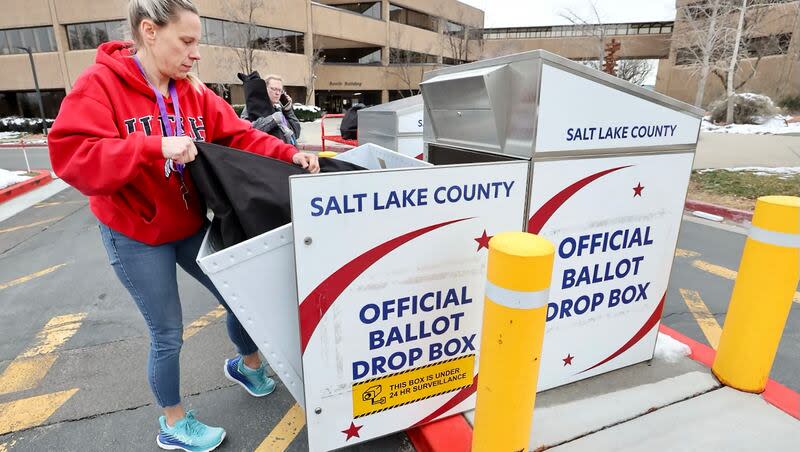Utah voters pick presidential nominees Tuesday

- Oops!Something went wrong.Please try again later.
Thousands of neighborhood precincts across the state will convene Tuesday night for their biennial party caucus as Republicans select a presidential nominee through an in-person preference poll and Democrats participate in a state-funded primary election.
State law allows parties to determine the method by which they allocate delegates in the presidential primary cycle. The two major parties in the state used party-run caucuses in 2016. However, the decision resulted in long lines, technical difficulties and decreased turnout compared to previous presidential nominating elections.
Democrats and Republics returned to a government-operated primary with mail-in ballots in 2020. This year they are split.
How will Utah Republicans choose a presidential nominee?
Utah GOP Chairman Rob Axson said increased investment by the party this year will ensure the caucus system is more accessible and smooth. But the biggest benefit, Axson said, is how in-person gathering, despite being inconvenient for some voters, strengthens the connections essential to democracy.
“I think anytime that we can nurture and strengthen our civic responsibility, and those habits of getting involved, it’s better for our country, and certainly better for our state,” Axson said Monday in an interview with the Deseret News.
The Utah Republican Party’s caucus system involves over 2,300 precinct meetings at hundreds of locations, including elementary and high schools, across the state, Axson said. Check-in begins at 6 p.m., with meetings running from 7 p.m. to 9 p.m., and results from the caucus’ presidential preference poll rolling in as soon as groups complete their precinct elections.
The caucus is open to any actively registered Republican in Utah. The deadline to change one’s party registration was Jan. 9. GOP voters can find their corresponding precinct location on the party’s website.
The only two candidates still pursuing the Republican presidential nomination are former President Donald Trump and former South Carolina Gov. Nikki Haley. Utah’s Republican presidential preference poll will have these two names and that of Texas businessman Ryan Binkley, who dropped out after ballots were printed, Axson said.
Utah’s 40 Republican delegates will be allocated proportionally between Trump and Haley unless one of them receives more than 50% of the votes, in which case the winning candidate will receive all of the delegates.
Trump currently has 273 delegates to Haley’s 43. A candidate needs 1,215 delegates to win the Republican Party’s nomination. Over 850 delegates will be apportioned during Super Tuesday on March 5.
The Utah GOP’s decision to run the presidential nominating process through a caucus instead of a primary has been a controversial one. When the party did the same thing in 2016, turnout dropped to 22.5% of active registered voters from nearly one-third who participated during the previous election where both parties had contested races in 2008.
Utah has 890,637 active registered Republicans, according to the state election office. If caucus participation follows a similar trend as eight years ago, Tuesday’s precinct meetings could see over 200,000 attendees, with many unable to participate because of work, or other conflicts.
But Axson disagrees with critics who say the caucus system limits voter participation, saying, “the participation is available to anybody who wants to take it.” Axson said attendance could be higher this year than past caucuses because of the party’s unprecedented investment of over $100,000 into digital, radio and print ads and the expanded options for absentee voting, which requires an email ballot to be printed off and brought to the precinct location by someone attending the caucus meeting. A picture of a valid government-issued ID must be included with the ballot.
“We support this idea of don’t just be a sideline participant in our system of government and in our communities,” Axson said. “Be an actively engaged member of the community that helps get to decide everything from delegates to what the issues and priorities are for our candidates and elected officials.”
While a recent Deseret News poll in the state showed Trump leading with a large margin over Haley, and then-candidate Florida Gov. Ron DeSantis, the state’s GOP chair predicted Tuesday’s results could be surprisingly close. Utah’s Super Tuesday status will allow the state to have a voice in the national discussion regardless of the results, Axson said.
“The longer that we are in the earlier nominating calendar the better because Utahns deserve to have a voice in that,” Axson said. “And I believe that the people of our country will benefit from their candidates engaging with Utahns more frequently and regularly because we tend to have some good ideas on how to solve the country’s challenges.”
How will Utah Democrats choose a presidential nominee?
Utah Democrats began receiving their vote-by-mail primary ballots from the Lieutenant Governor’s Office, which oversees elections, on Feb. 13. Ballots must have been postmarked by the end of Monday, or delivered to a drop box by 8 p.m. on Tuesday, to be counted.
The names on the ballot are President Joe Biden, Rep. Dean Phillips, D-Minn., activist Marianne Williamson, Gabriel Cornejo and Frank Lozada.
Around 3,000 individuals are expected to attend the Utah Democratic Party’s caucus proceedings Tuesday night at over 50 precinct locations, according to the party’s executive director, Thom DeSirant. The meetings will consist only of party business, not primary voting.
“Neighborhood caucus night is the largest bi-annual gathering of Democrats across the state and it’s how we build our local state party,” DeSirant told the Deseret News Monday in a written statement. “It’s not just about our state though, it’s also about making sure our voices are heard nationally on Super Tuesday. With President Biden’s re-election campaign in motion, it’s crucial that we stand behind him and make our support known.”
Registered Utah Democrats can find more information about how to participate in Tuesday’s caucus, where precinct officers and county delegates will be selected, on the party’s website.
